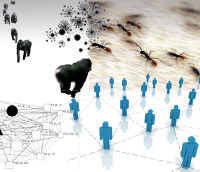Orateur
Margaux Rat
(University of Cape Town)
Description
The study of social preferences or avoidances between individuals living in a group is of crucial importance because it enables to investigate the influence of social interactions on key factors such as share of resources or information and ultimately the extent of cooperation. One social aspect which has been linked to fitness benefits in several species is the centrality of an individual within its group. This measure reflects how well individuals are connected to other members of the social network and it has been shown to be predicted by individual attributes. As a first step to understand the role of social networks in sociable weavers we investigated whether individuals that are more or less connected to their group members, share phenotypical attributes such as sex, age and dominance status. The sociable weaver is a long-lived passerine endemic to southern Africa that lives year-round in communities and exhibits a suite of cooperative behaviours including communal nest building and food provisioning of young. Such apparently extensive levels of cooperation suggest a complex social system where the level of network connectivity has the potential to play an important role in individual cooperative investment and fitness. We recorded associations at feeders located underneath two communal nests between September and November 2012. We found that males exhibit higher levels of network connectivity than females. This first result is likely to reflect the male-biased philopatry and female-biased dispersal in this species, ensuing high degree of relatedness among males but not females within colonies. Furthermore, helping-at-the-nest is also male biased, suggesting that individuals that associate more may cooperate more. Here we present our preliminary results on individual attributes and network position. The future, additional and ongoing work aims to clarify this potential link between social network metrics and levels of cooperation in other tasks such as nest building or predator defense.
Auteur
Margaux Rat
(University of Cape Town)
Co-auteurs
Dr
Claire Doutrelant
(CEFE-CNRS Montpellier)
Dr
René van Dijk
(University of Sheffield-UK)
Dr
Rita Covas
(CIBIO-Portugal)

